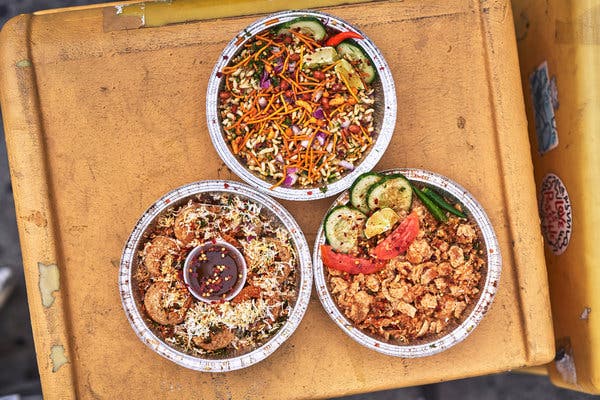Two Bengali snack carts face off on this corner of Jackson Heights, Queens. Each claims one side of a 24-hour Duane Reade, a rare bland spot in the throng of storefronts promising South Asian sweets and back-room lunch buffets basking in steam.
Tong was the first to open, a year and a half ago, followed by Fuskahouse this past January. At first, Fuskahouse parked a block away, but according to Masud Rahman, the owner, nearby restaurants complained that they were losing customers, and he had to move.
The two carts’ menus are virtually identical, headlined by fuchka, a Bengali snack that is kin to gol gappa in India’s north and pani puri in the west and south. Coins of semolina dough are slid into hot oil, where they puff up, to emerge as crackly, translucent husks.

Each orb is pinched at the top to make a hole, calling to mind an eggshell, hatched. A mash of potatoes and yellow vatana, or yellow split peas, is tucked inside, so that crunch collapses into creaminess, under a heap of red onions, bright cilantro, green chiles (on request) and kinks of grated hard-boiled egg.
What matters most is the tamarind water, the deep tang of tamarind punched up by bitnoon (black salt with a hint of sulfur) and a masala whose recipe is confidential to each vendor. Pour a little into the gaping shell, or else just dip the orb in, then pop it whole into your mouth. It bursts into a slake of sour-sweet, cool and hot at once.
The arrival of two fuchkawalas (fuchka vendors) on the same patch of turf would not be news in Dhaka, Bangladesh, or Kolkata, the capital of the Indian state of West Bengal. There, you have your pick of carts with fuchka shells stacked high, draped in plastic, like trapped balloons.
But in New York, it’s not so common to find Bengali snacks on the street. “Everything is here, except this,” said Md. Naeem Khandaker, 26, the owner of Tong and a native of Bangladesh.
He makes his fuchka shells with a touch of rice flour, for extra crispness, and builds his masala out of 16 ingredients that must go unnamed. Two types of tamarind water are available, one thrillingly sour (and superior), the other tipping toward sweet.
His rival at Fuskahouse, Mr. Rahman, 33, is a fellow Bangladeshi immigrant who used to drive a taxi and now runs two Subway franchises in Westchester. The men know each other; a few years ago, they were briefly roommates.
Mr. Rahman said he had long planned to open a Bengali snack cart, and when he saw the snaking lines at Tong — “people waiting, waiting” — he felt there was need for another option.
The fuchka shells at Tong are light and quick to shatter, but so are those at Fuskahouse. In truth, both versions are delicious, although I preferred Tong’s for its sour tamarind water; Fuskahouse offers only one type, with a sugary tinge.
Some of the same elements in fuchka reappear in chotpoti: mashed potatoes and yellow vatana doused with tamarind water until almost soupy, with the fuchka shells crushed and littered on top. Again, a slight edge goes to Tong for adding tomato and cucumber, jolts of freshness in an earthy dish.
But Fuskahouse’s jhal muri is the one I’d return for, puffed rice tossed with chanachur — a spicy fry of lentils, flattened rice, peanuts and matchstick-length noodles of chickpea flour, and a snack unto itself — and a spoonful of sauce, just enough to make each bite fervent without wilting. The leftovers stayed crisp all the way home.
And Fuskahouse’s aam vorta is bracing, the raw mango anointed with masala, chile, mustard oil and kasundi (fermented mustard-seed paste) — sweet and sour vying for victory.
Both carts have their admirers, all willing to wait as their snacks are assembled. One blindingly hot day, teenagers lounged in the sliver of shade under the Duane Reade canopy and traded banter with the Fuskahouse cooks. A female acquaintance was mentioned, and a young man called out, “I’ll give you her number for 10 fuchka.” No deal.
Whichever cart you choose, remember that fuchka must be eaten right away. On another sun-drunk afternoon, a family huddled by the Tong cart, ready to pounce when the fuchka came out. Quickly, the father spooned tamarind water into the shells and handed them around the circle, the puffs ever so slightly aslosh.
A bite, and they were gone.



